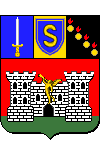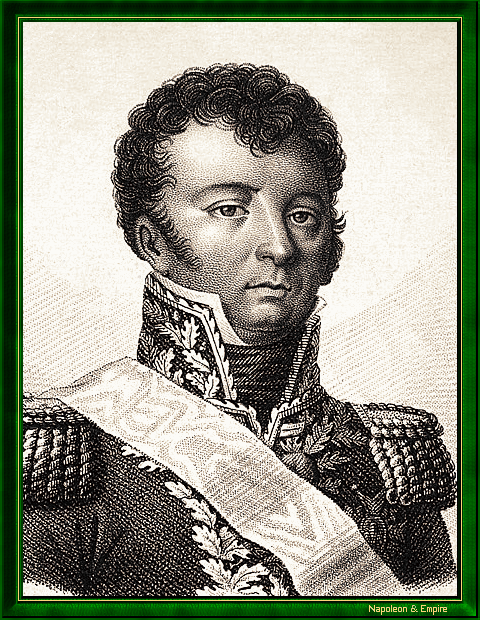Dominique-Joseph-René Vandamme
Count of Unsebourg
Pronunciation:

Dominique-Joseph-René Vandamme was born on November 5, 1770 in Cassel, Flanders (now the department of Nord), to a surgeon father. In July 1788, he enlisted in a colonial regiment garrisoned in Martinique. He reached the island in March 1789, was promoted to sergeant a few months later, but deserted and returned to France in April 1790.
Two years later, in September 1792, he formed a "compagnie franche", the Vandamme chasseurs, which he led to the Armée du Nord, becoming its captain.
When his company was amalgamated with the battalion of chasseurs du Mont-Cassel in early September 1793, he was promoted to lieutenant-colonel and head of this corps. On September 7 and 8, his battalion formed the vanguard of the army at the battle of Hondschoote. On September 27, he was appointed brigadier general; on October 21, he took part in the capture of Furnes. In 1794, he fought at Werwicq, Ypres, Nieuport and took part in the invasion of Holland. During the two years he spent in Belgium, he stood out for his free speech and harshness towards the civilian population. Accused of exactions in conquered countries, he was discharged in June 1795.
Recalled after four months, he served for a time in the Army of the West, before being sent to the Rhine, where he took command of a division in Württemberg in February 1799. Having changed nothing in his methods, except to give them greater scope, he was recalled to Paris in March to face a council of war. The charge: having levied contributions for his personal profit, and having exercised and tolerated concussions and depredations. When the council failed to meet, Vandamme was reinstated in September and sent to Holland under Guillaume Marie-Anne Brune. There, he defeated the English at Bergen, Alkmaar and Castricum (October 6).
After a four-month leave of absence, the reasons for which are unclear, he was posted back to the Army of the Rhine in March 1800. On the following May 23, he was again recalled to France, for administrative irregularities. Vandamme still had time to take part in the battles of Stokach, Mösskirch and Memmingen. Discharged on August 17, he was nevertheless given a command of the future Grisons army, known as the reserve army, in September.
Under the Empire, he distinguished himself in 1805 by capturing the Donauwörth bridge (October 6) and the Pratzen plateau during the battle of Austerlitz (December 2). These outstanding actions earned Vandamme the Grand Cross of the Legion of Honor. Relieved of his command in 1806 due to a disagreement with Marshal Jean-de-Dieu Soult, he quickly regained a division under Marshal Michel Ney and, at its head, forced the town of Glogau to surrender on December 5, 1806. He went on to capture Breslau on January 4, 1807, Brieg-sur-Oder on the 17th, Schweidnitz on February 8, and Neisse on June 16. On the 23rd, he took the entrenched camp established in front of the town of Glatz.
In September 1807, Vandamme was given command of the 16th military division; in August 1808, of the Boulogne camp. Meanwhile, in March 1808, he was made Count of Unsebourg. On March 11, 1809, he took command of the 8th corps of the Grande Armée, made up of soldiers from Württemberg, and fought at Landshut, Eckmühl, Linz and Wagram, where he was wounded.
He began the French invasion of Russia under the orders of Jérôme Bonaparte, King of Westphalia, but was soon sent back to France for allowing his troops to plunder the country.
Napoleon 1st entrusted him with command of the 1st Corps of the Grande Armée in March 1813. On August 30, 1813, he was taken prisoner by Cossacks at Kulm after a stubborn battle. Brought before Alexander 1st, he displayed the same freedom of speech for which he had been criticized since 1793. Accused by the Tsar of being a looter and a brigand, he replied peremptorily: I am neither a robber nor a brigand, but in any case my contemporaries and history will not reproach me for having dipped my hands in my father's blood
.
Deported to Siberia, Vandamme did not return from captivity until July 1814. On his return, the King of France, Louis XVIII refused to grant him an audience and placed him under house arrest in Cassel. Vandamme naturally rallied to Napoleon during the Hundred Days. Peer of France and commander of the 3rd Corps, he was at Ligny and Wavre, where he scored a major success, and covered the army's retreat after battle of Waterloo bringing an almost intact corps back to Paris, with which he occupied the villages south of the capital, raising hopes for a moment that the fate of the campaign had not been sealed on the Brabant plateau.
This hope abandoned, Vandamme refused the offer of command-in-chief of the army from a group of generals, withdrew behind the Loire and submitted to the king.
However, he was included in the royal decree of July 24, 1815 - a proscription order - and was forced into exile, embarking for the United States. On his return to France in 1819, he divided his time between Kassel and Ghent, writing his memoirs. He died in his native town on July 15, 1830.
"General Vandamme". Print of the nineteenth century.

His bad temper undoubtedly cost Vandamme the marshal's baton. Napoleon had the best way of describing his tumultuous personality: If I had two Vandammes, I'd have one shot, but I'd keep the other...